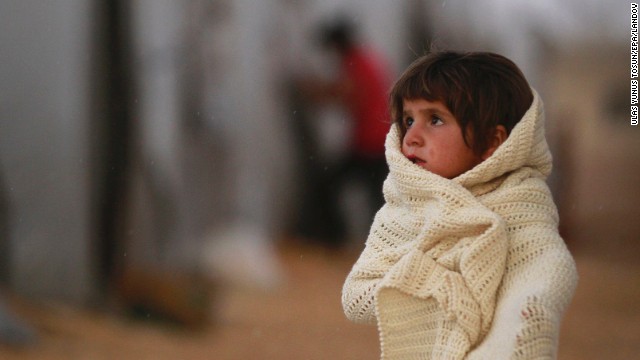Nov 01, 2014
First line of defense against terrorism: Mom and Dad, CNN.com
First line of defense against terrorism: Mom and Dad
By Peter Bergen and David Sterman
updated 5:03 PM EDT, Wed October 29, 2014
 A Syrian refugee wraps herself in a blanket as she stands near tents in the Suruc district near Sanliurfa, Turkey, on Thursday, October 2. As many as 200,000 people have left the area surrounding the Syrian city of Kobani, also known as Ayn al-Arab, because of the militant group ISIS, the Syrian Observatory for Human Rights said in September.
A Syrian refugee wraps herself in a blanket as she stands near tents in the Suruc district near Sanliurfa, Turkey, on Thursday, October 2. As many as 200,000 people have left the area surrounding the Syrian city of Kobani, also known as Ayn al-Arab, because of the militant group ISIS, the Syrian Observatory for Human Rights said in September.
STORY HIGHLIGHTS
- 3 Colorado girls are intercepted on their way to the Middle East, allegedly to join ISIS
- Their families alerted authorities, who were able to find them in Frankfurt airport
- Peter Bergen: Families often spot signs of radicalization and alert officials
- More terrorism plots disrupted by families than by controversial NSA surveillance
The key lead in this case wasn't high-tech surveillance by the National Security Agency or a tip by a government informant, but a tip to the FBI by the girls' worried families.
Assad Ibrahim, the Sudanese-American father of one of the girls, received a call from his daughter's Denver school telling him she was missing. When he tried calling her, she did not pick up. Ibrahim went to the father of the other two girls to check whether their passports were missing. They were. The families then went to the FBI, which intercepted the girls at the Frankfurt airport. The key role that families play in preventing violent extremism is often overlooked in favor of focusing on more exotic counterterrorism measures such as the National Security Agency's surveillance programs or the use of paid informants. In fact, a survey by the New America Foundation of 251 jihadist terrorism cases in the United States since 9/11 found that almost a third of the individuals accused of engaging in some kind of terrorist crime have been implicated by a tip from a family member or a member of the Muslim-American community. By contrast, only a little more than 1% of these cases was generated by one of the NSA's most controversial surveillance programs, in which the agency collected every American's phone data for several years. Families are often critical in stopping radicalizing individuals from stepping over the edge into militant activity. Take Adam Dandach, a 20-year-old Orange County man who was charged in July with committing passport fraud in an effort to join ISIS. His mother hid his passport so he could not leave the country. When more than 20 Somali-Americans left from Minnesota after 2007 to fight for the al Qaeda affiliated Al Shabaab group in Somalia, family and community members played critical roles in the ensuing FBI investigation. After Abdirizak Bihi's nephew, Burhan Hassan, left to fight for Al Shabaab in Somalia in November 2008, Bihi worked to organize community cooperation with the government's investigation. As Ralph Boelter, who oversaw the FBI's investigation, put it in 2009 when the Justice Department unsealed charges against eight men accused of supporting Al Shabaab, "It is through the sustained and dedicated efforts of the Minneapolis Joint Terrorism Task Force and the support of the Somali-American community that today we are able to disclose some of the significant progress we have achieved in this critical investigation.". Families are not a panacea. Sometimes family members intervene with a radicalizing individual, but the intervention doesn't work. Shannon Conley, a 19-year-old Colorado woman, pleaded guilty in September to conspiring to provide material support to ISIS. Her family sought to dissuade her from seeking to join jihadists in Syria, but their efforts failed and she was arrested on April 8 at Denver International Airport on her way to Syria. Samir Khan traveled to Yemen from Charlotte, North Carolina, in 2009 where he became the editor of al Qaeda in the Arabian Peninsula's Inspire magazine despite several attempts by his family members and elders from the local Muslim-American community to dissuade him from his militant views. Two years later Khan was killed in a U.S. drone strike in Yemen. Sometimes a family will warn U.S. authorities about a radicalizing child, but the warning isn't sufficiently followed up on. The Nigerian "underwear bomber," Umar Farouk Abdulmutallab, tried to blow up a bomb secreted in his underwear over Detroit on Christmas Day 2009. Luckily the bomb failed to detonate. A month earlier, Abdulmuttalab's father had gone to the U.S. Embassy in Abuja, Nigeria, and told State Department officials there that he believed his son was meeting with extremists in Yemen. The U.S. Embassy in Nigeria issued a warning to the U.S. National Counterterrorism Center, but Abdulmuttalab was not put on the "no fly" list and the center's analysts did not make an effort to determine if Abdulmuttalab possessed a valid U.S. visa.Families are often, of course, the first to notice if a son or daughter is radicalizing and are a key bulwark against extremism. Why and how some people radicalize is a subject that is complex, but one indicator is usually unambiguous and that is that radicalizing individuals will often spend a great deal of time on jihadist websites or consuming jihadist social media. Many parents don't have much of a clue about what is happening online, but a common sense approach if they suspect their son or daughter is radicalizing is to get a better handle on their children's social media use and profile. Read CNNOpinion's new Flipboard magazine. Follow us on Twitter @CNNOpinion. Join us on Facebook/CNNOpinion.

FEATURED BOOK

